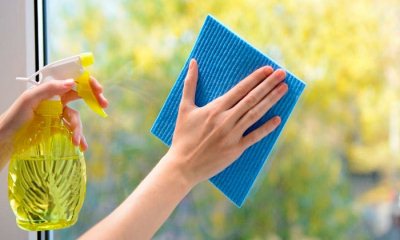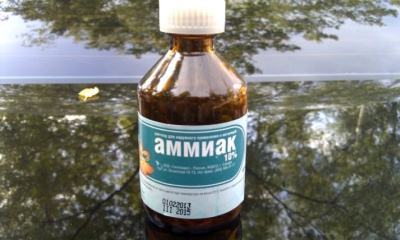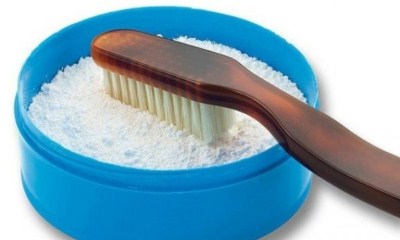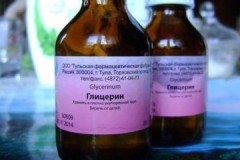Is it possible and how to properly wash windows with ammonia?
 Ammonia is one of the means for removing dirt and stains from various surfaces. With its help, you can also clean window glass with high quality - to a shine, and without streaks.
Ammonia is one of the means for removing dirt and stains from various surfaces. With its help, you can also clean window glass with high quality - to a shine, and without streaks.
To do this, you need to know exactly how to use the drug, and how best to prepare the most effective solution for glass.
In this article, we will tell you if and how to wash windows with ammonia.
Content
All features of the use of funds
Ammonium alcohol - it is an ammonia solution with a pronounced unpleasant odor... One of its applications is as a solvent for complex types of pollution.
The peculiarity of the application is the use of ammonia in small dosages, which should not be exceeded. This component gives a good result, coping with a large number of types of pollution.
Advantages and disadvantages of the method
 There are many advantages to using ammonia in glass cleaning solutions. The obvious advantages include:
There are many advantages to using ammonia in glass cleaning solutions. The obvious advantages include:
- low cost;
- availability of purchase - the drug is available in any pharmacy;
- efficiency;
- ease of use;
- cost-effectiveness of spending.
Minuses:
- sharp unpleasant odor;
- the need to exercise caution when using.
Despite the disadvantages, the use of ammonia solution is so effective that you should not abandon it because of shortcomings.
The procedure for preparation and proportions of the solution
Before you start washing the windows, the ammonia must be diluted. It is possible to prepare a solution according to several recipes.
You should first prepare the necessary inventory:
- container for mixing components;
- sponge;
- rags or napkins.
Standard recipe
 To prepare the simplest recipe based on ammonia, you only need it and water. Solution creation process:
To prepare the simplest recipe based on ammonia, you only need it and water. Solution creation process:
- Pour 5 liters of water into a container.
- Add 5 ml of ammonia.
- Stir.
Despite the apparent simplicity of the composition, the solution is very effective.
Formulation with glycerin to prevent ice formation
If the goal is not only to wash the windows, but also to make them shine, and also to prevent ice from forming, then you can adopt a recipe with an additional component - glycerin.
By itself, this substance does not have the ability to remove dirt and stains. Its introduction into the composition is intended to provide additional shine to transparent glass. An additional effect is the prevention of frost formation on the windows in winter and dust settling.
Cooking procedure:
- pour a glass of water into the prepared container;
- add 0.2 l of glycerin;
- add ammonia (5 drops);
- stir.
How to wash without streaks?
Before you start cleaning the glass, you should prepare the window opening area. This requires:
- Remove foreign objects.
- Remove the curtains.
- If the windows are very dirty, wash off the main dust and dirt. Dusty - wipe with a dry or damp cloth, eliminate cobwebs.
Washing procedure:
 Wash frames, slopes. This can be done with any suitable means, including those prepared for glass - with ammonia. It is most convenient to use a sponge or rag for this purpose.
Wash frames, slopes. This can be done with any suitable means, including those prepared for glass - with ammonia. It is most convenient to use a sponge or rag for this purpose.- Clean the glass using a sponge or cloth. For tall windows and hard-to-reach areas, it is better to use a special mop.
- It is necessary to wash off the glass mainly from top to bottom to avoid smearing the dirt.
- Wipe dry.
- Make the blinds look good.
Small amounts of ammonia, which is part of the cleaning solutions, do not harm metal-plastic.
Top 3 alternative options
In addition to the use of ammonia, other means will help to achieve good results in washing glasses.that can be found in the household. What they have in common is that they are affordable and provide good cleaning performance.
Vinegar
Depending on the degree of neglect of the window state, a solution suitable in concentration is selected. The standard recipe involves making a mixture of ½ liter of water, a quarter cup of vinegar, and less than half a teaspoon of dishwashing gel.
Dentifrice
 Chalk or toothpaste will work if the glass is heavily soiled.
Chalk or toothpaste will work if the glass is heavily soiled.
For this in a liter of water, you need to dilute 50 grams of powder... The resulting composition is applied to glass, and cleaned off with a napkin after drying.
Particularly dirty areas can be treated separately by preparing a gruel cleaning mixture. The recipe is similar, only water is used several times less.
Onion
A head of an onion cut in half is quite able to cope with stubborn dirt on the windows - drips, insect marks, etc.
To eliminate stains, you need to rub the problem area with a fresh cut... After that, the window is washed in the usual way.
Washing the entire window with an onion is laborious, but it is very suitable for removing local contamination.
A few more ways how to wash windows using available tools are presented in the video:
11 tips to help
Tips from a cleaning service provider to help you tidy up your windows quickly and efficiently:
- Do not use abrasives to clean windows. They can scratch the glass and damage the frame and seal.
- Strong solvents (acetone and others) should not be added to the glass cleaner. They can damage the plastic surfaces and get into the window chambers through technological holes, which can reduce the heat-saving qualities of glass units.
- The cleaning agent left over from cleaning windows can be used to tidy up mirrors, furniture glass fronts, etc.
- When using products with ammonia, you must take precautions - protect your eyes, wear rubber gloves on your hands, etc.
- It is advisable to carry out all work on cleaning windows with good ventilation.
- Do not use ammonia for cleaning windows in a pure, undiluted form.
- After cleaning with ammonia, the room must be ventilated.
- Difficult window surfaces (e.g. hardware) can be cleaned using an old toothbrush and cotton swabs.
- It is better to use different sponges for cleaning frames and glasses.
- Final polishing of glasses should be carried out only with completely dry and lint-free materials - microfiber napkins, newspapers, etc.
All the most effective and inexpensive folk methods and recipes for cleaning windows can be found in this section. You will find a lot of important and useful information about fast and effective window cleaning in this section.
Conclusion
Washing windows with ammonia is not difficult, since the recipes are all very simple. The result is a clean, shiny, streak-free surface. Plus - cost savings, since the purchase of expensive cleaning products is canceled.



